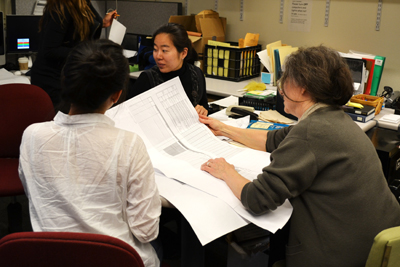By Karene Booker

Graduate student Yoo Mee Lee works in the Cornell Language Acquisition Lab with Professor Barbara Lust on research results of how multilingualism affects children.
When young children learn a second language, it strengthens their ability to pay attention to the right stuff, reports a new Cornell study.
"Our study showed that bilingualism in young children strengthens what is known as executive attention, which helps orient individuals in the sea of information coming in," said Sujin Yang, Ph.D. '07, lead author and now a professor at Tyndale University College in Canada. "It helps them know what to pay attention to, what to ignore and what action to take."
The study, co-authored by Barbara Lust, professor of human development in the College of Human Ecology at Cornell, and Hwajin Yang of Singapore Management University, is published in the July issue of Bilingualism: Language and Cognition.
"We were able to begin to separate out the effects of bilingualism from the effects of culture, which other studies had not done," noted Lust. "Culture strongly influences parenting and child development. Emphasis on behavioral control and inhibition at an early age -- a feature more often found in East Asian cultures - has been linked to improved attention in children. Western cultures, by contrast, tend to emphasize individuality and self expression."
In their study of 56 4-year-olds with college-educated parents living in middle-class neighborhoods, the researchers compared native English-only speaking U.S. children, bilingual children in the United States, Korean-only speaking children in the United States and Korean-only speaking children in Korea. The Korean and Korean-English speaking children from the United States had first generation native Korean parents; the bilingual children had about 11 months of formal exposure to English through a bilingual daycare program.
The study reports that a child's version of a computer-game test that is designed to assess various components of executive attention showed that the Korean-English bilingual children were significantly faster and more accurate compared with the other three groups. The researchers also found that the Korean-speaking children in Korea were more accurate than the Korean-only and English-only speaking children in the United States, indicating a sizable effect of culture. This accuracy, however, was accompanied by slower response times.
Their results suggest not only that bilingualism is good for executive attention, but also that executive attention develops quite early in both cognitive development and in the process of gaining a second language.
"If executive attention is improved by bilingualism, then we should be able to detect and perhaps enhance improvements in academic skills. Ultimately, we want to understand how bilingualism is creating the advanced executive attention," Lust said. "Understanding this could potentially lead to other interventions to facilitate the development of this essential capacity."
The work was supported by the College of Human Ecology and Cornell's Mario Einaudi Center for International Studies.
Karene Booker is an extension support specialist in human development.

